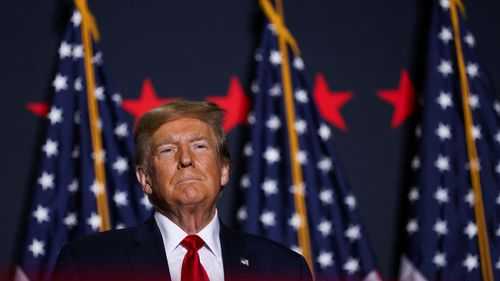
Egypt and Jordan have gotten the message. The two Arab states that share borders with Palestinian territories want President Trump to know that they are making progress in coming up with an alternative to his “Riviera on the Mediterranean” plan for Gaza.
Trump’s refusal to rescind his threat to have the U.S. take ownership of the Gaza Strip, clear the enclave of its residents, and build a world-class development project in its place was aimed at convincing Arab states, especially Egypt, that they needed to provide a tangible plan of their own. Just saying “no” to taking in displaced Palestinians wasn’t going to cut it. Nor would it be sufficient to make vague declarations about how they’re thinking about discussing the possibility of considering the development of an alternative plan.
Now it appears the Egyptian-led plan is taking shape.
According to reports, it would not require depopulating the enclave. Instead, the plan is likely to propose establishing safe zones for temporary internal displacement, similar to those the IDF has established during the war.
One obstacle regarding the wartime humanitarian zones was that Hamas operated from within them, using the Gazans in those zones as human shields. Not to worry, say the Egyptians: Hamas isn’t invited to remain in any position of power.
While it’s unclear so far how the coalition implementing this plan would keep Hamas out, Egypt will at least have skin in the game and plenty of incentive to prevent sabotage: According to the Associated Press, Egyptian firms expect to participate in the rebuilding.
They wouldn’t be the only ones: the Emiratis are expecting Trump to be receptive to the plan in part because of the estimated $20 billion the Arab states would contribute. “Trump is transactional so $20 billion would resonate well with him,” Emirati academic Abdulkhaleq Abdullah told Reuters. “This would benefit a lot of U.S. and Israeli companies.”
As for who would run the enclave, the AP reports: “Central in Egypt’s proposal is the establishment of a Palestinian administration that is not aligned with either Hamas or the Palestinian Authority to run the Gaza Strip and oversee the reconstruction efforts, according to the two Egyptian officials involved in the efforts.”
That’s accords with Israeli Prime Minister Benjamin Netanyahu’s stated opposition to the Palestinian Authority’s participation in postwar governance.
Still, the coalition envisions some role for PA head Mahmoud Abbas: “The proposal also calls for a Palestinian police force, mainly made up of former Palestinian Authority policemen who remained in Gaza after Hamas took over the enclave in 2007, with reinforcement from Egyptian- and Western-trained forces.”
There appears to be wide agreement that the $20 billion number is on target. A UN, EU, and World Bank estimate matches it but suggests that the amount will only get reconstruction through the first three years. Their five-year estimate is $50 billion.
Egypt also wants it understood that its willingness to put boots on the ground in Gaza is contingent upon promises from Trump that this process is intended to eventually result in the establishment of a Palestinian state.
That demand was not unexpected, but there’s still some chutzpah in it coming from Egypt. Gaza was the closest thing the Palestinians have had to an independent state, and it was a disaster in part because of Egypt. Hamas’s longevity is connected to its ability to resupply and reinforce its fighting units, which in turn was made possible by Egypt’s turning a blind eye to the smuggling tunnels running underneath the Gaza border crossing.
Which brings us to the stakes of the Gaza postwar reconstruction. A truly fresh start in Gaza would be a rare second chance not just for the Palestinians but for the Arab states in the region. As much as they love to pawn it all off on Israel, Gaza was administered by Egypt before 1967 and the West Bank by Jordan, which only relinquished its claim on the territory two decades after that war. They don’t want any part in running those territories anymore but they still want to make demands of Israel and the U.S. to fix a problem they created by spending the first 25 years of Israel’s statehood trying to snuff it out.
Israelis, however, are far less interested in humoring Arab states’ sense of entitlement post-Oct. 7. And Trump is clearly not going to be bossed around by them. Perhaps they’ll start pulling their weight for the first time.






